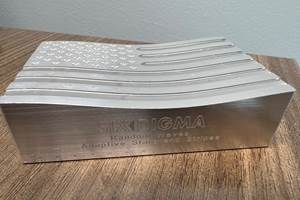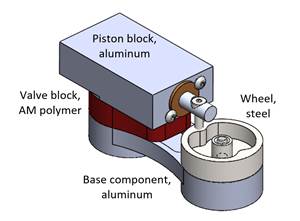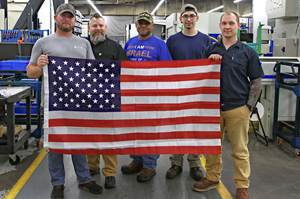Software Helps Niche Manufacturing Job Shop Tackle Complex 3D Machining Jobs
This nine-person firm founded in the early 1950s, has found a niche machining molds and other complex 3D parts for a long list of blue chip clients.
Share






Mars Manufacturing (Hayward, California), a nine-person firm founded in the early 1950s, has found a niche machining molds and other complex 3D parts for a long list of blue chip clients.
All of the firm‚Äôs jobs are programmed with SurfCAM software from Surfware, Inc. (Westlake Village, California) and cut on Fadal and Toyoda machining centers. With just two seats of SurfCAM, the firm has taken on projects for clients including H.J. Heinz, Campbell‚Äôs Soups, Hewlett-Packard, John Deere and Compaq Computer. ‚ÄúWe specialize in 3D, and we‚Äôre always in search of the most complicated, most complex machining jobs,‚ÄĚ explains Gene DeGennaro, Mars Manufacturing‚Äôs president. ‚ÄúThe more complicated the job is, the more interesting it is for us to work on.
‚ÄúWe‚Äôre looking for the 3D parts with lots of undercuts,‚ÄĚ he continues. ‚ÄúIf you envision an end mill as being a cylindrical object, you can‚Äôt cut underneath a surface, such as doing a keyhole or an undercut. Another way of looking at it is removing a small segment from a circle. How do you machine under the legs? That‚Äôs the type of work that we specialize in doing. Rather than using ball end mills, we use spherical end mills.‚ÄĚ
The list of parts manufactured by Mars Manufacturing is diverse and cuts across multiple industries. The common thread is the specific knowledge that the company has had to acquire in various niche markets and the complexity of the molds and parts being machined. One niche market that the company has been involved in is the milling of replacement parts for automated can-making equipment. ‚ÄúUp until a few years ago, every tuna can made in the United States was made with parts we manufactured,‚ÄĚ says Mr. DeGennaro.
Another niche product with which Mars Manufacturing has been involved is the manufacturing of pellicle frames for the semiconductor industry. ‚ÄúPellicles are basically a filter designed to keep dust and particulate off of photo masks, so that they don‚Äôt get reproduced into the silicon wafers,‚ÄĚ explains Mr. DeGennaro. ‚ÄúThe pellicle frame is just 1 or 2 millimeters thick and 1 to 10 millimeters high. It‚Äôs made of aircraft alloy aluminum and manufactured to tolerances of 2 or 3 thousandths of an inch. They are mounted on a photo mask, and there is an optically clear film that goes on the other side of it. So needless to say, they are quite difficult to machine.‚ÄĚ
A third major product line for the company is thermoform molds, where sheets of plastic are heated and stretched across the mold to produce the finished product. ‚ÄúThink about the package of batteries that you buy at the grocery store,‚ÄĚ explains Mr. DeGennaro. ‚ÄúThere are often three batteries in there, and they are stacked up in triangular fashion so that they hold themselves in position. Now imagine that package being laid out flat. Those are the types of packaging molds that we do.
‚ÄúWith thermoform molds, you have to drill vacuum holes in them‚ÄĒholes with a number 74 or 76 drill, as small as 20 thousandths of an inch,‚ÄĚ reports Mr. DeGennaro. ‚ÄúUsing SURFCAM, we lay out our vacuum holes on different layers and then select them linearly to generate a drilling cycle. In one particular instance, the mold had more than 6,000 holes in it and we did it all with one drill with no breakage whatsoever.
‚ÄúRegardless of which product line we happen to be working on, we take advantage of just about everything that SurfCAM can do, from auto roughing and planar machining to Z finishing and multi-surface machining,‚ÄĚ says Mr. DeGennaro. ‚ÄúTraditionally, we tell customers that on a normal delivery, we can turn a complete package‚ÄĒwhich includes design, sample parts, and production tooling‚ÄĒin 3 weeks.
‚ÄúSurfCAM generates NC code so easily for us that it has really given us a competitive edge. We‚Äôre confident enough to send NC programs to the machine tools and let them run unattended.‚ÄĚ
‚ÄúThe designs we receive from customers are created in Pro/Engineer or SolidWorks or another solid modeling package,‚ÄĚ relates Mr. DeGennaro. ‚ÄúWhen we take the solid model and bring it into SurfCAM, it‚Äôs totally seamless‚ÄĒall of the surfaces are correct. This is extremely important to us, because if you‚Äôre doing auto generation or auto machining and there‚Äôs a seam in a surface, the machine tool is going to want to push the cutter right through that crack, which results in a scrap mold that can cost you thousands of dollars.
A ‚Äúpower user‚ÄĚ of SurfCAM, Mars Manufacturing has honed its ability to machine the most complex 3D molds and parts, and the company now has the luxury of picking and choosing the types of work that it wants to do next.
Related Content
Building Machines and Apprenticeships In-House: 5-Axis Live
Universal machines were the main draw of Grob’s 5-Axis Live — though the company’s apprenticeship and support proved equally impressive.
Read MoreSolve Worker Shortages With ACE Workforce Development
The America’s Cutting Edge (ACE) program is addressing the current shortage in trained and available workers by offering no-cost online and in-person training opportunities in CNC machining and metrology.
Read MoreFinding Skilled Labor Through Partnerships and Benefits
To combat the skilled labor shortage, this Top Shops honoree turned to partnerships and unique benefits to attract talented workers.
Read MoreManufacturing Technology and Training in Europe
NTMA’s European Tech Tour exposed attendees to the latest technology and traditional training methods used by European manufacturers.
Read MoreRead Next
Machine Shop MBA
Making Chips and 91 ”∆ĶÕÝ’ĺőŘ are teaming up for a new podcast series called Machine Shop MBA—designed to help manufacturers measure their success against the industry’s best. Through the lens of the Top Shops benchmarking program, the series explores the KPIs that set high-performing shops apart, from machine utilization and first-pass yield to employee engagement and revenue per employee.
Read MoreAMRs Are Moving Into Manufacturing: 4 Considerations for Implementation
AMRs can provide a flexible, easy-to-use automation platform so long as manufacturers choose a suitable task and prepare their facilities.
Read More




















